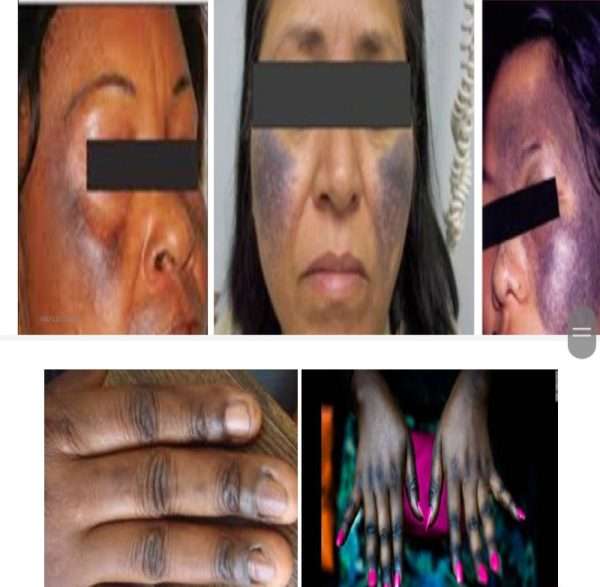
As there seems to be no end in sight to the unhealthy race of becoming the cynosure of all eyes among Nigerian women, with loads of harmful chemicals emerging in different brands of cosmetics, the National Agency for Food and Drug Administration and Control (NAFDAC) has sent warning signals to all Nigerians on the dangers inherent in the continuous usage of bleaching creams, hair dyes and other illegal cosmetics, stating that they make users vulnerable to cancer, organs damage, infections, among other.
Citing a CNN data set which ranked Nigeria as the top consumer of the creams, with 75 per cent of women in Nigeria patronising whitening products, the health agency said it’s high time Nigerians prioritised their health, and desist from the usage of harmful chemicals as cosmetics. It also revealed Nigeria’s contribution to the global skin lightening market, which is expected to be worth S31.2 Billion US Dollars by 2024, according to the World Health Organisation (WHO) report.
In her presentation at the Media Sensitisation Workshop on Dangers of Bleaching Creams and Regulatory Controls, held recently in Lagos, Deputy Director, DR&RA, NAFDAC, Pharm. Linda Halim, identified some evidence-based cancer causing ingredients in cosmetics such as “N-nitrosodiethanolamine(NDELA) formed by the interaction of 2 otherwise safe ingredients; 2 bromo-2-nitropropane-1,3 diol(BNPD) a preservative and 1, 4 dioxane”.
She further asserted that para-phenylenediame causes severe sensitisation eczema, while asbestos contamination in talcum powder has been indicated in cases of ovarian cancer.

The cosmetics regulator buttressed her statements with the findings of a 1972 Kirkland USA study, which showed that women who coloured their hair had a greater chromosomal damage with mutagenic and carcinogenic effects. She also mentioned the outcome of a 1978 research on a population of 558,000 women, 20-26 years of age, on the use of hair dyes in Califonia. Findings showed that 25 per cent of the women in study contacted cancer of the bone marrow.
Pharm. Halim further enlightened Nigerians on the common bleaching agents they should watch out for on the labels of their creams and the recommended quantity, and once they are discovered or exceeded the appropriate quantity, they should discontinue usage.
According to her “ The common bleaching agents used in the cosmetics industry are as follows: hydroquinone: not more than 2%; topical retinoids; plant derivative poducts:- arbutin, paper mulberry, poly phenols, soy proteins; other agents:-azelaic acid (yeast), kojic acid 1-4%, glutathione, AHA and mercury”.
While she encouraged those who became victims of skin bleaching by the manufacturers fraudulent act to seek redress through the Consumers Protection Commission, she cautioned those whitening their skins deliberately to seize from it as the inhibition of melanin makes the skin prone to cancer and other diseases.
Speaking on the theme of the workshop, Acting Director General, NAFDAC, Dr Monica Eimunjeze, decried the abuse and misuse of prescription medicines as cosmetics in the country, noting the overall impact on citizens’ health, as she disclosed the agency’s plan to clampdown on all dealers of unregistered and illegal cosmetics in the nation.
Acknowledging that bleaching, skin whitening or lightening is a global issue, she explained that the agency used the avenue to sensitise citizens on the dangers of misuse and abuse of cosmetic products on their health, and why they need to make the right choice in the type of their cosmetics.
Eimunjeze said ” There are those that do not come for registration and exist in different spheres within the community. We also have products that are misuse and abuse in the name of bleaching, whitening or lightning; for instance, the topical syrups. They have a clear place in medicines, thus they shouldn’t be offer for sale in cosmetics stores.
“There is a place of steroids use under the prescription of a medical practitioner. The misuse and abuse we have seen in our system is when these products are used as cosmetics.
“ We are out to create awareness on the possibility and dangers of these products, to limit your choices to areas that have been subjected to regulation and control”.
In his contribution, Director of Public Affairs, NAFDAC, Dr Ibrahim Jimoh, noted the importance of the workshop, as skin bleaching has evolved from the state of an epidemic to pandemic, which requires urgent enlightenment of the media and masses in order to curb the havoc wreaked on human health.













